A new engineering program at Elon aims to prepare students for solving complex problems.
There was a time when a purely technical focus was all an engineering student needed to be successful. But technological advancements and changes in how information is delivered and consumed have radically changed the way we interact with the world. Gone are the days of working in a vacuum. Collaboration and innovation are now a part of everyday life. When it comes to engineering, there has been a shift to a more holistic approach to create innovative thinkers.
“There’s a lot of unhappiness about the way engineers are prepared, particularly at the undergraduate level,” Richard Miller, president of Olin College of Engineering and a leading force behind the reinvention of engineering education, said during a recent interview. “This past commencement season, fewer than 5 percent of undergrads got a degree in any kind of engineering at any university in America. And one of the few things that America still exports is technology and entrepreneurship, which is pretty hard to do without having any engineers.”
According to a recent survey by Engineering.com, a leading online destination for engineers of all disciplines, recruiters reported that besides technical knowledge, they seek engineering candidates who are problem-solvers, who can think critically, who are motivated and who have communication and interpersonal skills. “There is real need to have engineers who are well-versed in the arts and sciences so that they have the background to identify and navigate increasingly complex problems in today’s world,” says Gabie Smith, dean of Elon College, the College of Arts and Sciences.
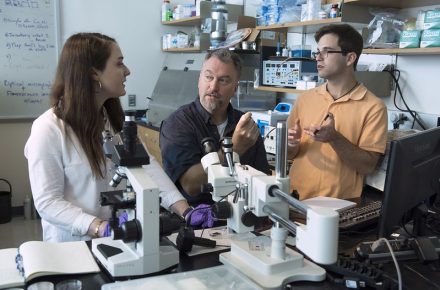
In response to this new reality, Elon is launching a four-year engineering program in the fall that aims to produce engineers capable of tackling difficult problems and affect change in the world. For years, Smith says, the Office of Admissions has reported that a four-year engineering degree is one of the most requested programs prospective students look for at Elon. That, paired with a higher demand nationwide for careers in STEM fields—science, technology, engineering and math—made the decision to add the new program more appealing. “With this degree program we are launching a truly innovative curriculum that is unlike many other undergraduate engineering degrees,” she says. “It is designed to build on the very mission of our institution while meeting the needs of the marketplace.”
Building on a strong foundation
For students like Matthew Del Valle ’21, the program couldn’t have come at a better time. From an early age, he knew he wanted to spend his life building, creating and researching. In middle school, he transformed his garage into a makeshift workshop where he could often be found tinkering with mechanical parts and building robots. That passion sparked his interest in engineering, a career path that ultimately led him to Elon. His brother, Kyle, who graduated in May with a finance degree, had a positive experience at the school, but Del Valle had some hesitations. At the time he applied, Elon only offered a dual-degree engineering program, which allows students to begin their studies at Elon before transferring to another institution to complete their engineering degree. Del Valle didn’t want to change schools halfway through his undergraduate experience. Luckily for him, toward the end of his senior year of high school, he learned of Elon’s plans to introduce the new four-year engineering program in 2018.
That news changed everything. “Because of my brother’s experience, I had faith in Elon. I had trust in Elon that whatever they do with this program, it will end up being great,” says Del Valle, now a first-year student at Elon studying biomedical engineering. “I think it’s going to be an incredible addition to this school. Elon has so much to offer already, but this will bring in a completely new wave of students.”
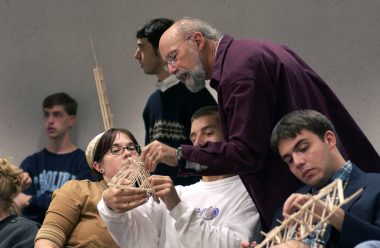 Smith says she sees the new program as the natural evolution of engineering at Elon, which traces its beginning back to 1999 when Associate Professor Emeritus of Engineering Rich D’Amato was hired to launch a new engineering affiliate program with North Carolina State University. “Elon was the university I always wanted to be at,” says D’Amato, who had worked for NASA and obtained degrees in aerospace engineering, ocean engineering and environmental civil engineering before pursuing a career in teaching. “We had some very fine students, as good as others I had taught at larger institutions.”
Smith says she sees the new program as the natural evolution of engineering at Elon, which traces its beginning back to 1999 when Associate Professor Emeritus of Engineering Rich D’Amato was hired to launch a new engineering affiliate program with North Carolina State University. “Elon was the university I always wanted to be at,” says D’Amato, who had worked for NASA and obtained degrees in aerospace engineering, ocean engineering and environmental civil engineering before pursuing a career in teaching. “We had some very fine students, as good as others I had taught at larger institutions.”
The partnership with N.C. State was the first step in Elon’s dual-degree engineering program. Students in that program spend the first three years of their undergraduate studies at Elon, taking a wide range of science, math, computer science and other Elon core courses along with discipline-specific courses. They then transfer to an affiliate engineering university for two more years and graduate with two degrees—one in engineering from the affiliated university and one in a complementary science or math program from Elon.
At Elon we have a strong emphasis on writing and reading, and most engineering schools still don’t make a big deal of that. They truly get a liberal arts degree along with an engineering degree.
When the program began, the first step was crafting what those first three years would look like. How could Elon best prepare students for the next steps in their education and careers? The answer was a robust foundation in the arts and sciences, along with engineering groundwork. “It’s clear this is an addition to their education because a chemical engineer doesn’t learn enough chemistry to get a chemistry degree,” D’Amato says. “A mechanical engineer doesn’t take as much math as our students do. It makes for a more complete engineer. Plus, at Elon we have a strong emphasis on writing and reading, and most engineering schools still don’t make a big deal of that. They truly get a liberal arts degree along with an engineering degree.”
The program initially offered mechanical engineering and civil engineering concentrations, both of which are rooted in physics. Over the years, other departments partnered with the program, expanding the disciplines Elon’s engineering students could study. As the program’s success grew, so did its affiliate partners. In addition to N.C. State, Elon’s dual-degree students can transfer to eight other institutions, including Georgia Tech, Virginia Tech, University of Notre Dame, University of South Carolina and Clemson University.
What started in 1999 with a handful of students grew to more than 81 in 2013. The success of the program led Elon officials to start considering the possibility of offering a four-year program. “The data supports the fact that we have a successful, growing program,” says Sirena Hargrove-Leak, an associate professor of engineering who is leading the new four-year engineering degree. “And so the natural progression was to offer students the option to stay on campus to complete their engineering studies.”
The need for a new approach
But relying on a conventional curriculum—one focused strictly on technical courses—was not the answer. If the dual-degree program had proven anything, it was the need to include arts and sciences offerings as part of any new program. “Elon is exceptional in its ability to focus on the student and make a well-rounded individual,” says Jake Smith ’18, a dual-degree student who is completing his electrical engineering degree at Georgia Tech. When he first came to Elon in 2012, he wanted to pursue an engineering physics degree, but after his experiences in and out of the classroom, he decided to become an electrical engineer. “The atmosphere at Elon encourages exploration of one’s interests,” he says. “I was able to work on a number of research projects at Elon, which helped spark my passion for electronics and circuits.”
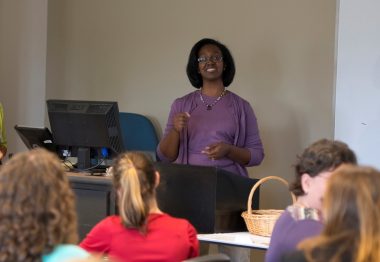 Ashley Davis ’08, associate director of health economics at RTI Health Solutions who studied engineering mathematics, agrees. “The dual-degree experience helped me to not only become a well-rounded engineer but also a great communicator,” she says. “The liberal arts component is not something an engineering student may be encouraged to explore at another university and I’ve found it invaluable in my career.”
Ashley Davis ’08, associate director of health economics at RTI Health Solutions who studied engineering mathematics, agrees. “The dual-degree experience helped me to not only become a well-rounded engineer but also a great communicator,” she says. “The liberal arts component is not something an engineering student may be encouraged to explore at another university and I’ve found it invaluable in my career.”
While Elon’s dual-degree program has been successful, it is clear engineering as a career has a problem, Hargrove-Leak says. “Part of that problem is that it’s a lot of math and science in the early semesters and that’s just not attractive to many students,” she says. “A traditional engineering program does not include as many opportunities for elective study outside of the major, but when you bring in many of the liberal arts education and experiences, you not only graduate a better engineer who is capable of solving problems, but you also have a breadth of experience so those students can lead a more balanced lifestyle.”
Students in the new four-year engineering program are required to complete Elon’s core curriculum, which means they have the opportunity to explore courses in civilization, society and expression. They are also able to engage in the Elon Experiences—global study, undergraduate research, service, leadership and internships. In the past, Hargrove-Leak says, these areas were known as “soft skills” in the engineering world, but employers are recognizing the power such skills have for success in the workplace.
She still remembers a conversation she had some years ago with an employer who had hired a student who had completed the dual-degree program at Elon. “We were talking and then there was this beautiful moment when she mentioned this new hire and I said to her, ‘Oh yes, that was one of our students,’” Hargrove-Leak recalls. “And she said, ‘Wait, he graduated from N.C. State,’ and I said, ‘Yes, he did, but he was a dual-degree student from Elon.’”
The employer went on to rave about how the candidate, in a competitive interview process, distinguished himself above all others because it was evident he was able to communicate effectively and was skilled at working with others. “They could identify that in the interview process,” Hargrove-Leak says. “Employers do recognize the difference.”
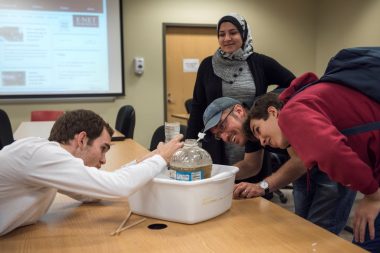 Smith certainly has noticed that, too. “I am finding that employers are extremely interested in candidates who have both the technical skills from an engineering school but also the communication skills to explain technical details effectively,” he says. “These traits will make for a very unique program that allows the student to both explore their interests in engineering and develop a global perspective in ways that purely technical institutions cannot.”
Smith certainly has noticed that, too. “I am finding that employers are extremely interested in candidates who have both the technical skills from an engineering school but also the communication skills to explain technical details effectively,” he says. “These traits will make for a very unique program that allows the student to both explore their interests in engineering and develop a global perspective in ways that purely technical institutions cannot.”
Beyond the rewards of taking part in an inclusive, broad-based engineering program, students are able to complete all their studies on the Elon campus. It’s an appealing proposition, particularly for those students who, like Del Valle, want to pursue various interests. Besides studying biomedical engineering, he is minoring in music technology. “I’ve loved music my entire life and I want to keep that going,” he says. “Elon is so versatile. You can really do what you want with your education here.”
For sophomore Skylar Barthelmes, being able to compete for Elon’s track and field team without disruptions while getting an engineering degree was a strong incentive. “I was a chemistry major taking engineering classes with hopes to pursue a chemical engineering degree,” she says. She is now enrolled in the four-year engineering program because it allows her to spend all her undergraduate years at Elon. “I have a coach who is willing to schedule practice times around my class schedule so I don’t have to worry about conflicting with a team practice schedule.”
Hargrove-Leak hopes more students like Del Valle and Barthelmes enroll in the program, not only for the sake of its success but for the betterment of society as a whole. “We have an aging infrastructure in this country that needs repair and we need to have knowledgeable, skilled people to make those repairs,” Hargrove-Leak says. “We also have an aging workforce in engineering. The Baby Boomers are retiring and we need to replenish that knowledge and skill. This program allows us to be a part of the solution.”
Creating an innovation hub
The launch of the four-year engineering program this fall has created the need to expand existing facilities. Currently housed in McMichael Science Center, the new program calls for greater integration and collaboration with other disciplines and a more hands-on curriculum approach.
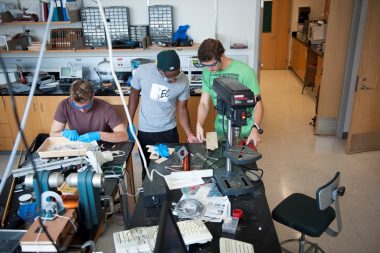 To accommodate these demands, the Elon University master plan calls for a three-story facility to be built next to McMichael building. “It will create an innovation hub and allow for in-depth collaboration,” says Vice President for University Advancement Jim Piatt, adding that the building will complete a quadrangle with McMichael and Richard W. Sankey Hall, which opens in the fall and will house the Doherty Center for Innovation, Creativity and Entrepreneurship, Chandler Family Professional Sales Center, a Design Thinking Center and Financial Education Center. “It will exemplify the spirit of innovation and entrepreneurship on the heart of campus.”
To accommodate these demands, the Elon University master plan calls for a three-story facility to be built next to McMichael building. “It will create an innovation hub and allow for in-depth collaboration,” says Vice President for University Advancement Jim Piatt, adding that the building will complete a quadrangle with McMichael and Richard W. Sankey Hall, which opens in the fall and will house the Doherty Center for Innovation, Creativity and Entrepreneurship, Chandler Family Professional Sales Center, a Design Thinking Center and Financial Education Center. “It will exemplify the spirit of innovation and entrepreneurship on the heart of campus.”
The new building, which will be approximately 30,000 square feet, will feature entrepreneurship and design spaces; design workshops for engineering students; classrooms designed for lectures, seminars and group work; student-faculty engagement spaces; laboratories and lab prep spaces; and research pods for equipment and research materials. Such spaces are crucial for the successful implementation of the program, says Sirena Hargrove-Leak, an associate professor of engineering who is leading the new four-year engineering program at Elon.
One of the requirements by the Accreditation Board for Engineering and Technology, Inc., the accrediting body of engineering programs in the United States, is to offer sufficient facilities for courses such as senior design. The course, she says, allows students to engage in real-world projects so they can put into practice all of the foundational material they have studied during their first three years at Elon. “Having a facility for them to do real hands-on work that models the work of a practicing engineer is extremely important,” Hargrove-Leak says. “They need to have space to be able to work. They need to have storage for their developing prototypes. They need to have equipment in order to build them and test them. Facilities are absolutely essential for a course like that.”
The estimated cost for the new building is $12 million. For more information about this project and ways to support it, contact Brian Baker, associate vice president and director of principal gifts, at (336) 278-7453 or bbaker7@elon.edu.


